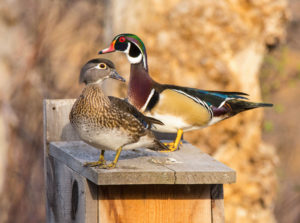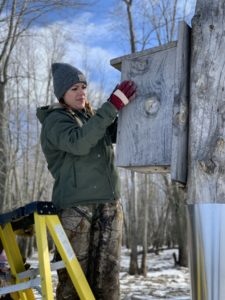On the Ground at the Shiawassee River SGA

Drake and hen wood duck on top of a wood duck nest box. Photo courtesy of the National Audubon Society.
On Saturday, February 29, 2020, 27 volunteers helped improve wood duck nesting opportunities in the Shiawassee River State Game Area (SGA). Volunteers came from near and far to be involved in this project, and it was a well-organized event by MUCC’s On the Ground (OTG) program, the Shiawassee Flats Citizens and Hunters Association (SFCHA), the Department of Natural Resources (DNR), and MI Birds. Volunteers spent the morning placing new wood duck boxes and cleaning out old boxes to prepare for the upcoming nesting season.
Pushed to the brink of extinction in the early twentieth century, wood ducks faced a loss of natural nesting cavities due to logging and pressure from overhunting. However, the passing of the Migratory Bird Treaty Act in 1918 provided these stunning waterfowl with the break they needed to begin rebounding across North America, and conservation efforts to improve nesting opportunities proved vital in the recovery of the species. Natural nest cavities continue to be rare in many parts of North America, and thus conservationists have relied on manmade nesting boxes as supplemental habitat. When placed correctly, wood ducks readily use these boxes to nest.
For this wood duck nest box project, volunteers gathered at the St. Charles DNR Field Office at 9 a.m. before splitting into two groups. One group went to place new wood duck nest boxes in a flooded timber stand near Wolf Creek, while the other group went out to separate areas within the SGA to check the nesting success of the nest boxes in each location. Volunteers were engaged throughout the course of each project, with individuals of all ages taking turns affixing the boxes to the trees, checking the old boxes and cleaning them out, placing new nesting materials and placing the predator guards.
The frigid temperatures in the days leading up to the event resulted in plenty of ice to support the volunteers in their habitat improvement efforts, but the day of the volunteer event boasted spring-like temperatures and plenty of sunshine. Volunteers were able to place ten new wood duck boxes throughout two large openings in the flooded timber region near Wolf Creek. The boxes were placed ample distances apart and facing different directions to prevent nest competition that can occur when nest boxes are too densely placed in one area. Additionally, predator guards were affixed to the tree at the base of each nest box to provide added protection against species like raccoons and squirrels. Proximity to food sources and shelter for ducklings was also taken into consideration during the placement project, and nest boxes were strategically placed near flora like buttonbush that could provide cover and food to ducklings immediately after leaving the nest.

A volunteer checks the contents of a wood duck nest box in the Shiawassee River SGA during the OTG event on Saturday, 2/29/2020.
Upon checking wood duck boxes that had been used the season prior, volunteers discovered signs of wood duck nesting success, nesting failure and occupation or use by other species. Materials seen in the boxes revealed use by wood ducks, mice and tree swallows, while other boxes showed no signs of occupation.
Following the morning in the field, volunteer groups met back at the St. Charles DNR Field Office for lunch and an event recap. Pizza from D’s Pizzeria and Eatery in St. Charles was served and volunteers were given t-shirts for their participation in the event. Additionally, volunteers learned about upcoming opportunities to get involved with MI Birds, SFCHA, and the OTG program. Volunteers were also given the opportunity to take the remaining wood duck nest boxes home with them.
Events like this illustrate the power that comes from partnerships in conservation. Engaging citizens in projects like those hosted by MUCC’s OTG program provide priceless opportunities to connect people with their natural resources and foster conservation stewardship. A big thank you to our partners at the DNR and SFCHA and to all the individual volunteers that spent their Saturday volunteering for wildlife.
The post On the Ground at the Shiawassee River SGA appeared first on Michigan United Conservation Clubs.
Recent Posts



